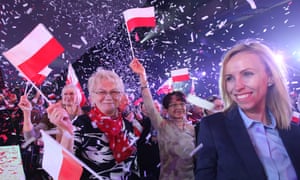Protecting Poland's Interests
"They tapped in so well to the general mood that 'We don't want refugees'."
"They [Poland] welcome the European Union if it brings funds but not if it brings migrants and the Western decadent lifestyle."
"[The Law & Justice party win occurred because people believed it would] create an invisible wall around Poland [insulating Poles from what they dislike]."
"We have reached the limit of our capacity to absorb changes. We are about to give the country to a bunch of political extremists who have been smart enough to send consoling signals to people who are scared. We are going through a kind of counter-Reformation."
Jacek Kucharczyk, head, Institute of Public Affairs
 |
| Supporters for the conservative opposition Law and Justice party at a rally in Warsaw. Photograph: Czarek Sokołowski/AP |
Poland, like Hungary and now suddenly Austria, and Denmark and many of the eastern European countries, feel they have had enough experience with welcoming foreign immigrants and refugees, diluting their cultures and their values through the introduction of cultures and values introduced by a religion that rejects much of what they value, to decide that they've had enough.
Xenophobia has its roots not only in suspicion of the other, but as well in exposure to the other which has not resulted in a serendipitous amalgam of cultures and values. The welcoming country has certain expectations, that the indigenous culture, heritage, and laws will be respected. That immigrants will be amenable to melding into the prevailing mores and social contract.
Europe has discovered over the years that when masses of Muslims move into a country they tend to keep themselves separate and apart, to live just as they did in the countries from which they came; spurning the priorities and values of the lands they have migrated to. And what's more, when their numbers reach a critical mass they feel entitled to agitate for special conditions and considerations favourable to their view of politics and religion and social welfare.
Instead of assimilating, of accepting that as new citizens of another country this is an obligatory courtesy to their future, the Muslim demographic deliberately holds itself apart, preferring not to mingle, not to accept wide social practise, not to surrender any element of their own religious laws that challenge the secular laws of the country, claiming that god's law supersedes man-made laws.
And so, perhaps the growing resentment at the presence of that irritating foreign element slowly transforming the familiar to the unfamiliar understandably had its effect in persuading Poles to vote for a right-wing, Euro skeptic, anti-immigrant party. "Poland will be a different Poland in Europe starting from today [election day]" pronounced Agnieszka Lada, expert on foreign affairs.
The Law & Justice party's slim majority will enable it to lead Poland in a new direction as a populist party with a hard line on migrants. The incendiary statements made by the party's leaders will not endear them to outsiders looking in. EU membership granting Poland their share of EU funds that drives their economy, along with open borders sit well with Polish voters.
It's just EU's interference in Poland's style and internal values that grates. It's called plucking the low-hanging fruit and rejecting the effort it would take to reach a little higher to conform to the general EU consensus, but that's obviously Poland's choice. Eerie resemblance between that and the other.
Labels: Crisis Politics, Economy, Immigration, Poland, Social-Cultural Deviations
0 Comments:
Post a Comment
<< Home